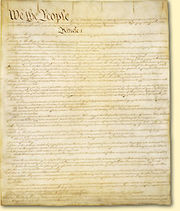Self-governance
Self-governance, or self-government, refers to the civic engagement of free citizens, and their consequent interactions with national, state, and local governments.
Lack of self-government leads to a "professional" political class. If citizens refuse to govern themselves, then others will gladly take up the task of governing them.
A lack of self-government leads to unaccountable bureaucracies, Progressivism, authoritarianism, and ultimately despotism.
Examples
Examples of self-governing activities include:
- Protesting (Tea parties, March for Life, etc.)
- Knowing one's history of American limited government (reading the Federalist Papers and other documents)
- Calling or writing one's representatives
- Attending local, state, and national governing sessions
- Attending grass-roots events, conventions, and planning sessions
- Election functions above and beyond election day (GOTV, primaries and caucuses)
- Voting
Most activities of self-governance do not happen on election day or within the boundaries of an election cycle.
Levels of self-governance
Self-government can refer to several levels of autonomy: A Nation's right to self-govern in light of globalism. The right of a state to self-govern in light of over-zealous national government. The right of a local government(county, municipality, etc.) to self-govern in light of over-zealous state government. An individual's right to self-govern in light of any out of control, oppressive regime no matter what level it occurs.
See also
| ||||||||

